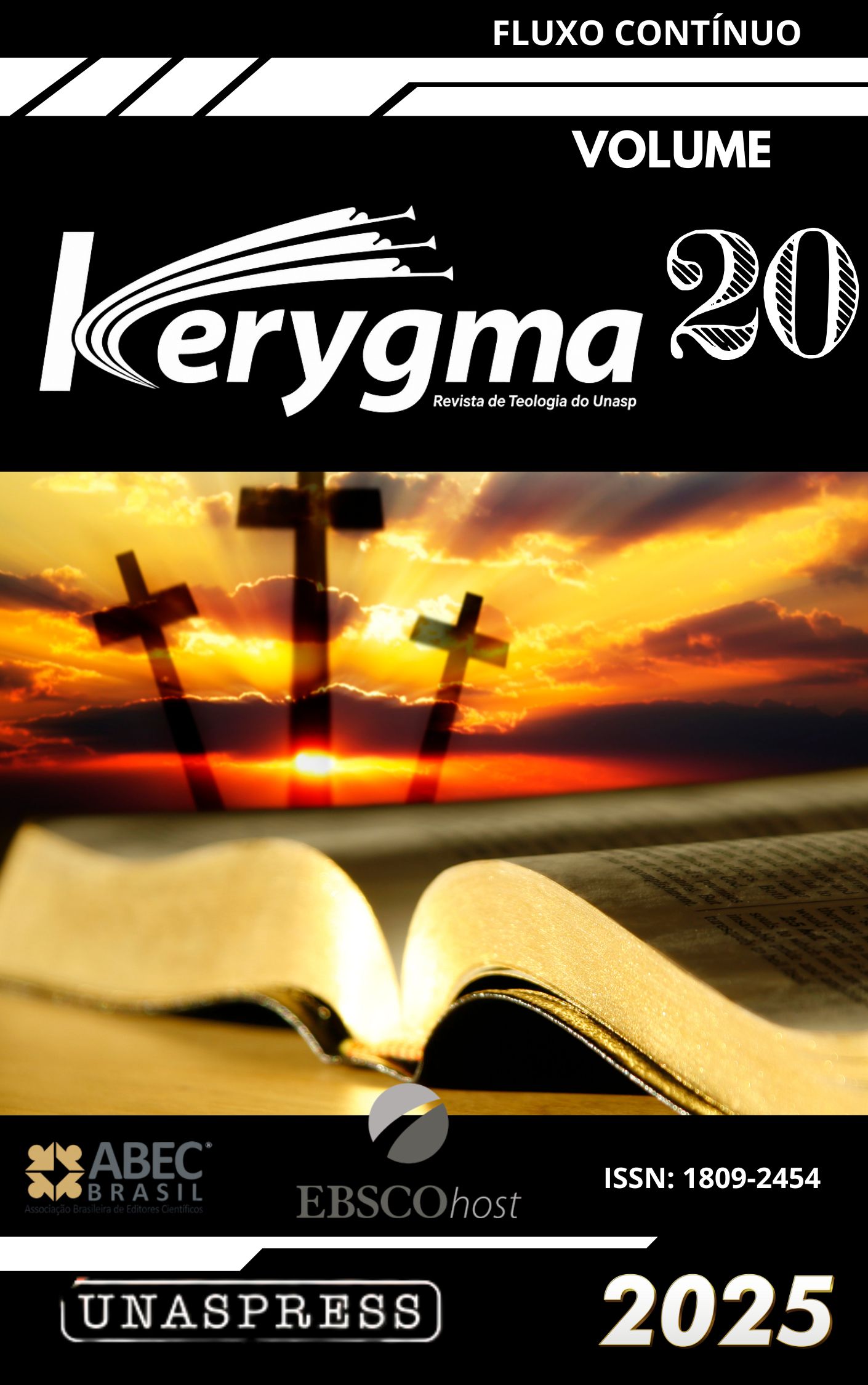Toward an Adventist Theology of Social Witness: Covenant-keeping in the “Already-not yet"
DOI:
https://doi.org/10.19141/1809-2454.kerygma.v20.n1.pe1675Palavras-chave:
Church, Social witness, Social issues, Covenant-keeping, Already-not yetResumo
This article explores selected implications of covenant-keeping for the church’s social witness within the theological framework of the “already-not yet” kingdom of God. Drawing on the work of Miroslav Volf and Matthew Croasmun, I maintain that the “already-not yet” theological framework both energizes and provides boundaries for the church as it embodies its witness regarding relevant contemporary social issues. This position will be enriched by selected supporting examples from conversation partners such as Padilla DeBorst (social marginalization and poverty), McCaulley (racial and ethnic discrimination), Volf (peacemaking and reconciliation), Richter (environmental stewardship), Yong (disability), and Swinton (mental health). Further, I will conclude that the social witness of the church should be central to the Adventist theological ethos in particular, rather than positioned at its margins or as a supplementary aspect. These insights aim to encourage the church to more fully embrace its role as a covenantal community in today’s social context.
Downloads
Referências
BLAZEN, I. T. Salvation. In: DEDEREN, R. (ed.). Handbook of Seventh-day Adventist theology. Hagerstown, MD: Review and Herald, 2000. p. 271-313. (Commentary Reference Series, v. 12).
CAMPBELL, M. W.; CHOW, C. C.; HOLLAND, D. F.; KAISER, D.; MILLER, N. P. (ed.). The Oxford handbook of seventh-day adventism. New York: Oxford University Press, 2024.
DEBORST, R. P. An integral transformation approach. In: OTT, C. (ed.). The mission of the church: five views in conversation. Grand Rapids, MI: Baker Academic 2016. p. 41-68.
GULLEY, N. R. Systematic theology: creation, Christ, salvation. Berrien Springs, MI: Andrews University Press, 2012. v. 3.
MACCARTY, S. In granite or ingrained? what the Old and New Covenants reveal about the Gospel, the Law, and the Sabbath. Berrien Springs, MI: Andrews University Press, 2007.
MCCAULLEY, E. Reading while black: African American biblical interpretation as an exercise in hope. Downers Grove, IL: IVP Academic, 2020.
OLSON, R. E. The journey of modern theology: from reconstruction to deconstruction. Downers Grove, IL: IVP Academic, 2013.
PECKHAM, J. C. Divine attributes: knowing the covenantal God of Scripture. Grand Rapids, MI: Baker Academic, 2021.
PECKHAM, J. C. God with us: an introduction to Adventist theology. Berrien Springs, MI: Andrews University Press, 2023.
PECKHAM, J. C. Why we pray: understanding prayer in the context of cosmic conflict. Grand Rapids, MI: Baker Academic, 2024. Kindle Edition.
RICE, R. Reign of God: an introduction to Christian theology from a Seventh-day Adventist perspective. 2. ed. Berrien Springs, MI: Andrews University Press, 1997.
RICTHER, S. L. Stewards of Eden: what Scripture says about the environment and why it matters. Downers Grove, IL: IVP Academic, 2020.
SWINTON, J. Finding Jesus in the storm: the spiritual lives of Christians with mental health challenges. Grand Rapids, MI: William B. Eerdmans, 2020. Kindle Edition.
VOLF, M.; CROASMUN, M. For the life of the world: theology that makes a difference. Grand Rapids, MI: Brazos, 2019.
VOLF, M. Exclusion and embrace: a theological exploration of identity, otherness, and reconciliation, revised and updated. Nashville, TN: Abingdon, 2019.
YONG, A. The Bible, disability, and the church: a new vision of the people of God.
Grand Rapids, MI: William B. Eerdmans, 2011.
Downloads
Publicado
Como Citar
Edição
Seção
Licença
Copyright (c) 2025 Kerygma

Este trabalho está licenciado sob uma licença Creative Commons Attribution 4.0 International License.
Declaração de direitos autorais
Em síntese, autores que publicam na Kerygma devem concordar que:
-
Após a aceitação, os direitos autorais dos artigos são transferidos à Kerygma.
-
Todo material de terceiros utilizado no texto deve estar corretamente referenciado.
-
Os autores devem possuir autorização para uso de imagens, tabelas e demais materiais gráficos.
-
Os autores asseguram que o texto é original, de sua autoria, e não foi submetido ou publicado em outro veículo.
-
As ideias e opiniões expressas são de responsabilidade exclusiva dos autores, não refletindo necessariamente a posição da revista.
-
Os editores reservam-se o direito de realizar ajustes textuais e adequações às normas editoriais.
-
Os autores mantêm os direitos autorais e concedem à revista o direito de primeira publicação, sob licença Creative Commons Atribuição–Não Comercial 4.0 Internacional.
-
Os autores autorizam a reprodução e adaptação do material pela Kerygma, mediante participação ou autorização expressa quando necessário.
-
A revista poderá distribuir, armazenar, arquivar e disponibilizar os artigos por quaisquer meios físicos ou digitais, gratuitos ou pagos.
-
Os autores podem firmar contratos adicionais para distribuição não exclusiva do trabalho, com menção à publicação original na Kerygma.
-
A reprodução integral ou parcial dos textos em outros meios requer autorização prévia e escrita do editor.
-
Os autores são autorizados e incentivados a divulgar seus trabalhos online antes ou durante o processo editorial, visando ampliar seu impacto acadêmico.














